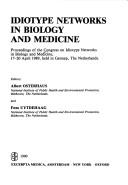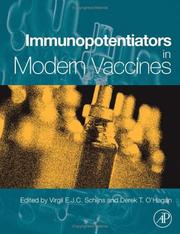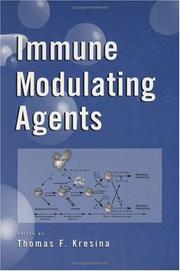| Listing 1 - 10 of 25 | << page >> |
Sort by
|

ISBN: 0444813438 Volume: vol 862 Publisher: Amsterdam New York Oxford Excerpta Medica
Abstract | Keywords | Export | Availability | Bookmark
 Loading...
Loading...Choose an application
- Reference Manager
- EndNote
- RefWorks (Direct export to RefWorks)
Idiotypic networks --- Antibodies, Anti-Idiotypic --- Immunoglobulin Idiotypes --- Congresses. --- immunology --- congresses. --- Congresses --- Immunoglobulin idiotypes --- Immunology --- Antibodies [Anti-idiotypic ]
Book
ISBN: 128359367X 9786613906120 9814335363 9789814335362 9781283593670 9789814335355 9814335355 Year: 2012 Publisher: Hackensack, NJ. : World Scientific,
Abstract | Keywords | Export | Availability | Bookmark
 Loading...
Loading...Choose an application
- Reference Manager
- EndNote
- RefWorks (Direct export to RefWorks)
The role of the cytokine, macrophage migration inhibitory factor (MIF), in the immune response and in the immunopathogenesis of different inflammatory, autoimmune, and infectious disorders is now well established. The aim of this handbook is to provide an authoritative volume covering all aspects of MIF, from basic molecular biology to structure-function relationships, pathophysiology, genetics, and drug development.Recent studies continue to broaden considerably the role of MIF in both normal physiology and pathology, which range from such diverse areas as oncogenesis, cardiac physiology, and
Cytokines. --- Immune response --- Immune modulation --- Immunity --- Immunomodulation --- Immunoregulation --- Regulation of immunity --- Regulation of the immune response --- Idiotypic networks --- Biological response modifiers --- Ir genes --- Cellular immunity --- Regulation. --- Regulation
Book
ISBN: 9789811681172 Year: 2022 Publisher: Singapore Springer Nature Singapore :Imprint: Springer
Abstract | Keywords | Export | Availability | Bookmark
 Loading...
Loading...Choose an application
- Reference Manager
- EndNote
- RefWorks (Direct export to RefWorks)
Immune response --- Regulation. --- Immune modulation --- Immunity --- Immunomodulation --- Immunoregulation --- Regulation of immunity --- Regulation of the immune response --- Idiotypic networks --- Biological response modifiers --- Ir genes --- Regulation
Book
ISBN: 9811681163 9811681171 Year: 2022 Publisher: Singapore : Springer,
Abstract | Keywords | Export | Availability | Bookmark
 Loading...
Loading...Choose an application
- Reference Manager
- EndNote
- RefWorks (Direct export to RefWorks)
Immune response --- Regulation. --- Immune modulation --- Immunity --- Immunomodulation --- Immunoregulation --- Regulation of immunity --- Regulation of the immune response --- Idiotypic networks --- Biological response modifiers --- Ir genes --- Regulation --- Resposta immunitària --- Fitoteràpia
Book
ISBN: 1281904767 9786611904760 3764383739 3764383720 Year: 2008 Publisher: Basel ; Boston : Birkhäuser,
Abstract | Keywords | Export | Availability | Bookmark
 Loading...
Loading...Choose an application
- Reference Manager
- EndNote
- RefWorks (Direct export to RefWorks)
The network paradigm dominated immunological research from the early 1970's to the late 1980's. The originator, Niels Jerne, hypothesized that the vast diversity of antibodies in each individual forms a network of mutual "idiotypic" recognition, thus regulating the immune system. In context of emerging concepts of systems biology such as cybernetics and autopoesis, the "Eigenbehavior" of the immune system fascinated an entire generation of young immunologists. But fascination led to experimental errors and overinterpretation, eventually magnifying the immune system from a mere infection-fighting device to a substrate of personality and individuality. As a result, what initially appeared as an exciting new perspective of the immune system is now viewed as a scientific vagary, and is largely abandoned. The author, himself a participant in the network vagary, begins with a description of the leading theoretical concepts on fact finding in science. This is followed by a historical account of the rise and fall of the network paradigm, complemented by personal interviews with some of the prominent protagonists. By comparing the network paradigm to other, more lasting concepts in life science, the author develops a general perspective on how solid knowledge is derived from error-prone scientific methodology, namely by exposure of scientific notions to the scrutiny of reality.
Idiotypic networks. --- Immune system --- Research --- History. --- Immunological system --- Anatomy --- Immunology --- Idiotype immune networks --- Idiotype networks --- Idiotypic immune networks --- Immune network theory --- Network theory (Immunology) --- Biological control systems --- Anti-idiotypic antibodies --- Life sciences. --- Life Sciences, general. --- Biosciences --- Sciences, Life --- Science
Book
ISBN: 1789851521 1789851513 1839621354 Year: 2019 Publisher: IntechOpen
Abstract | Keywords | Export | Availability | Bookmark
 Loading...
Loading...Choose an application
- Reference Manager
- EndNote
- RefWorks (Direct export to RefWorks)
Immune Response Activation and Immunomodulation has been written to address the perceived needs of both medical school and undergraduate curricula and to take advantage of new understandings in immunology. We have tried to achieve several goals and present the most important principles governing the function of the immune system. Our fundamental objective has been to synthesize the key concepts from the vast amount of experimental data that have emerged in the rapidly advancing field of immunology. The choice of what is most important is based on what is most clearly established by experimentation, what our students find puzzling, and what explains the wonderful efficiency and economy of the immune system. Inevitably, however, such a choice will have an element of bias, and our bias is toward emphasizing the cellular interactions in immune response by limiting the description of many of the underlying biochemical and molecular mechanisms to the essential facts. This book gives an insight into the role of cytokines in activating immune response during pathogenic invasion. Immunomodulation, aryl hydrocarbons, the role of the protein defensin and nucleated cells in provoking immune response, Bcl protein/gene-based apoptotic pathways, and plant-derived phytochemical-mediated immune response are all central themes of this book.
Immune response --- Immune system. --- Regulation. --- Immunological system --- Anatomy --- Immunology --- Immune modulation --- Immunity --- Immunomodulation --- Immunoregulation --- Regulation of immunity --- Regulation of the immune response --- Idiotypic networks --- Biological response modifiers --- Ir genes --- Regulation --- Life Sciences --- Immunology and Microbiology --- Pure Immunology
Book
ISBN: 9781617616969 1617616966 1617615544 9781617615542 Year: 2011 Publisher: New York
Abstract | Keywords | Export | Availability | Bookmark
 Loading...
Loading...Choose an application
- Reference Manager
- EndNote
- RefWorks (Direct export to RefWorks)
T cells. --- Immune response --- Immune modulation --- Immunity --- Immunomodulation --- Immunoregulation --- Regulation of immunity --- Regulation of the immune response --- Idiotypic networks --- Biological response modifiers --- Ir genes --- T lymphocytes --- Thymus-dependent cells --- Thymus-dependent lymphocytes --- Thymus-derived cells --- Lymphocytes --- Regulation. --- Regulation
Book
ISBN: 9789811957598 Year: 2022 Publisher: Beijing ; Singapore : Science Press : Springer,
Abstract | Keywords | Export | Availability | Bookmark
 Loading...
Loading...Choose an application
- Reference Manager
- EndNote
- RefWorks (Direct export to RefWorks)
Immune response --- Myocarditis. --- Regulation. --- Myocardium --- Myositis --- Immune modulation --- Immunity --- Immunomodulation --- Immunoregulation --- Regulation of immunity --- Regulation of the immune response --- Idiotypic networks --- Biological response modifiers --- Ir genes --- Inflammation --- Diseases --- Regulation --- Miocarditis --- Resposta immunitària

ISBN: 0128040955 012804019X 9780128040195 9780128040959 0120884038 0080457215 661063047X 1280630477 9786610630479 Year: 2006 Publisher: Amsterdam ; Boston : Elsevier Academic Press,
Abstract | Keywords | Export | Availability | Bookmark
 Loading...
Loading...Choose an application
- Reference Manager
- EndNote
- RefWorks (Direct export to RefWorks)
This book provides an in-depth insight and overview of a number of most promising immunopotentiators in modern vaccines. In contrast to existing books on the subject it provides recent data on the critical mechanisms governing the activity of vaccine adjuvants and delivery systems. Knowledge of immunological pathways and scenarios of the cells and molecules involved is described and depicted in comprehensive illustrations.* Contributions from leading international authorities in the field* Well-illustrated, informative figures present the interactions between immunopotentiators and
Vaccines. --- Biologicals --- Immunological adjuvants. --- Immune response --- Immune modulation --- Immunity --- Immunomodulation --- Immunoregulation --- Regulation of immunity --- Regulation of the immune response --- Idiotypic networks --- Biological response modifiers --- Ir genes --- Adjuvants (Immunology) --- Adjuvants, Immunologic --- Adjuvants, Immunological --- Immune adjuvants --- Immunoactivators --- Immunoadjuvants --- Immunologic adjuvants --- Immunomodulators --- Immunopotentiators --- Immunostimulants --- Regulation. --- Regulation

ISBN: 1000145972 1000110125 1003064671 0585388857 0824701038 Year: 2020 Publisher: Boca Raton : CRC Press,
Abstract | Keywords | Export | Availability | Bookmark
 Loading...
Loading...Choose an application
- Reference Manager
- EndNote
- RefWorks (Direct export to RefWorks)
Discussing the systemic immune response in the contexts of health, disease, and therapy, this unique resource-the only broadly based book of its kind available on the subject-offers comprehensive examinations of the pathways and agents that affect the human immune response and provides state-of-the-art presentations on practical methods of immune modulation. Focuses on the immune response and modulation in infectious diseases, such as HIV, hepatitis, and parasitic infections and highlights immune modulating agents in gastrointestinal diseases, sepsis, cancer, and autoimmunity! Written by over 50 international authorities representing distinguished institutions in nine countries, Immune Modulating Agentsintroduces basic immunoregulatory mechanisms as homeostasis details cytokines, cellular and humoral immune responses, and hematopoiesis describes neuroendocrine - immune system interactions and the role of psychological stress on immune competence delineates factors that influence disease susceptibility, including nutrition covers drug delivery systems, gene therapy, organ transplantation, arthritis treatment, and vaccination strategies shows how to design clinical trials using immune modulating agents and more!
Immune response --- Biological response modifiers. --- Regulation. --- Biomolecules --- Cancer --- Cellular control mechanisms --- Immunopharmacology --- Biological response modulators --- Biomodulators --- BRMs (Biochemistry) --- Immunomodulators --- Immunoregulators --- Modifiers, Biological response --- Modulators, Biological response --- Idiotypic networks --- Biological response modifiers --- Ir genes --- Immune modulation --- Immunity --- Immunomodulation --- Immunoregulation --- Regulation of immunity --- Regulation of the immune response --- Immunotherapy --- Regulation
| Listing 1 - 10 of 25 | << page >> |
Sort by
|

 Search
Search Feedback
Feedback About UniCat
About UniCat  Help
Help News
News